AYON Loader HDAs
Introduction
AYON Loader HDAs serve as controllers that let you select and load AYON products into your scene.
- Generic Loader: As the name suggests, it is generic and loads any AYON product as a filepath.
- Lop Import (Load Asset): Loads USD assets.
- Load Shot: Loads USD shots.
| Generic Loader |
|---|
Currently, Available in OBJs, SOPs and LOPs.  |
| LOP Import | Load Shot |
|---|---|
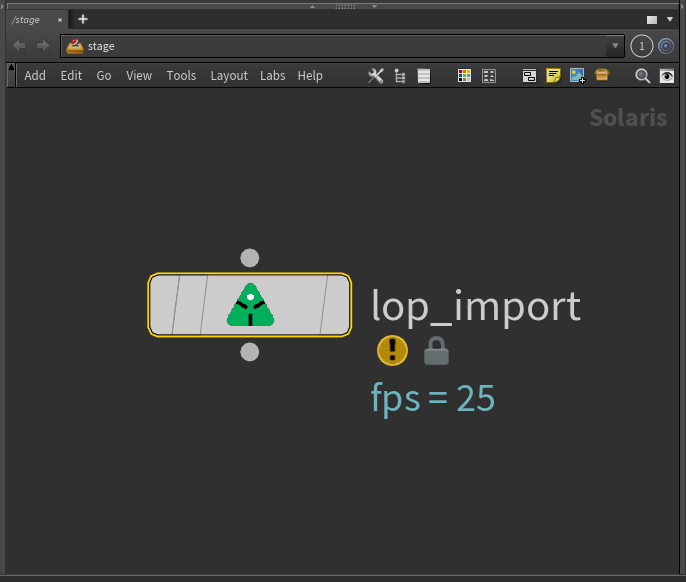 | 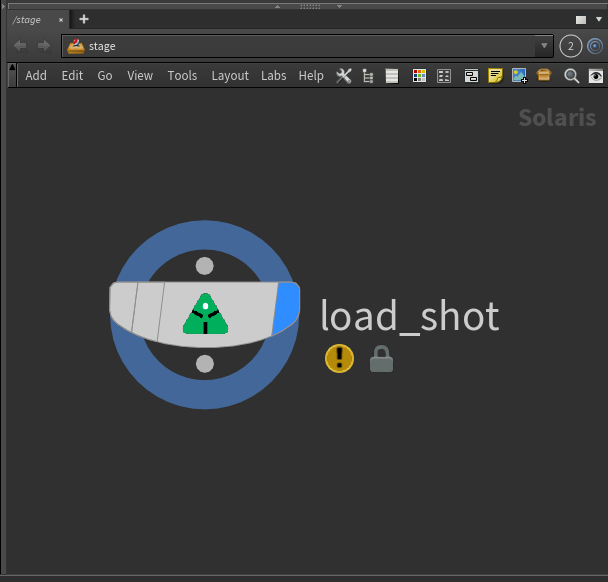 |
Access Loader HDAs
TAB Menu
All of these nodes are accessible in the TAB menu.
| LOPs | OBJs | SOPs |
|---|---|---|
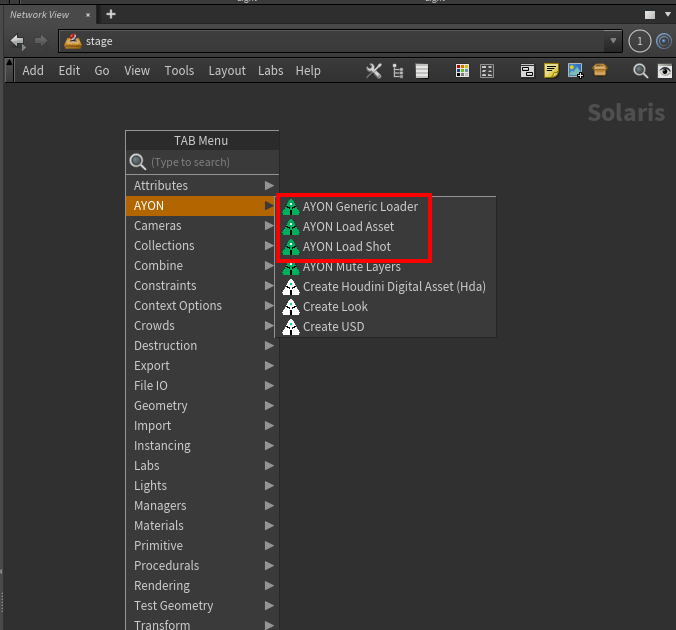 | 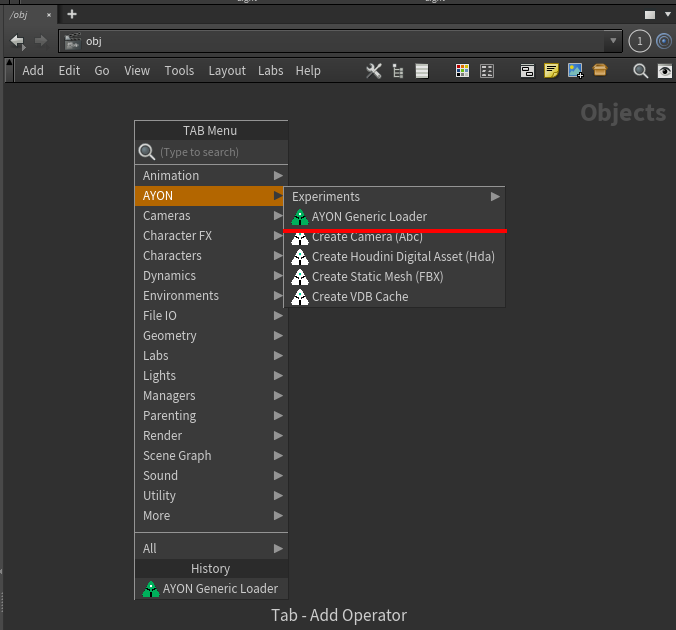 | 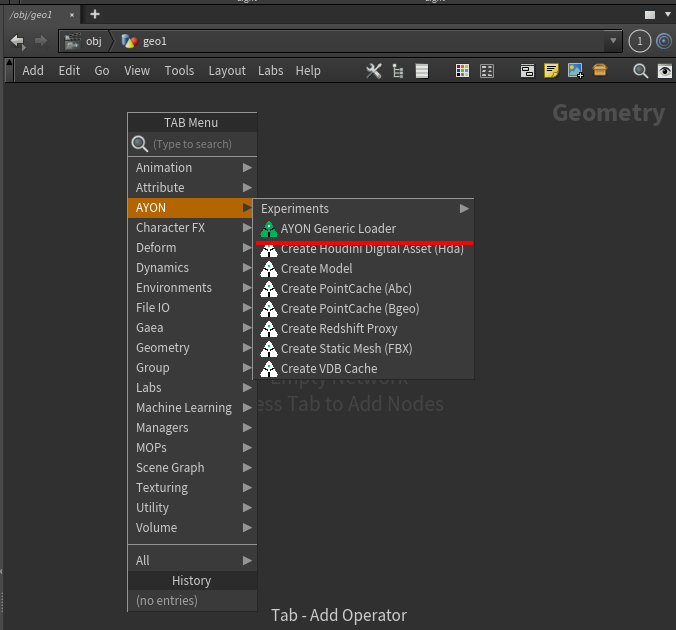 |
Loader Tool
Some loader plugins rely on these nodes to perform loading:
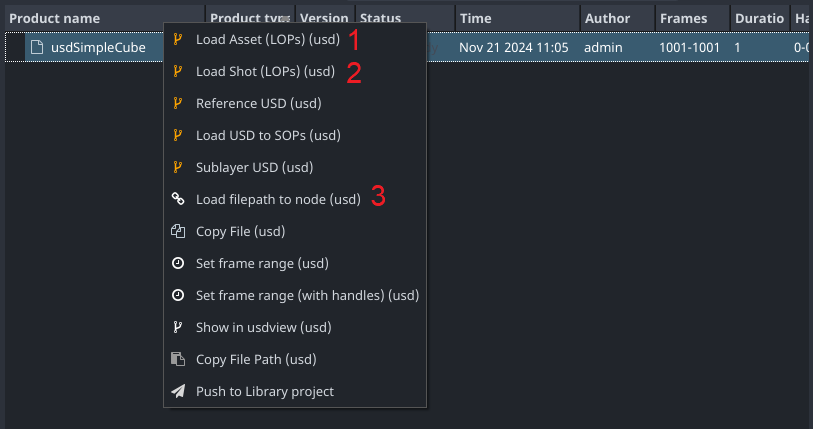
- Load Asset: Creates a
LOP Importnode in\stage. - Load Shot: Creates a
Load Shotnode in\stage. - Load Filepath to Node: Creates a
Generic Loadernode in\obj\AVALON_CONTAINERS.
Quickly Load into Any String Parameter
You can find a parameter action called Load with AYON by right-clicking any file-type parameter on non-Rop nodes.
This action creates a Generic Loader node in \obj\AVALON_CONTAINERS, copies its file parameter to the File parameter where the action was triggered, and opens the parameter panel for the created Generic Loader node.
When using the Load with AYON parameter action with a file parameter already connected to a Generic Loader, it opens the parameter panel for that Generic Loader node without creating a new one.
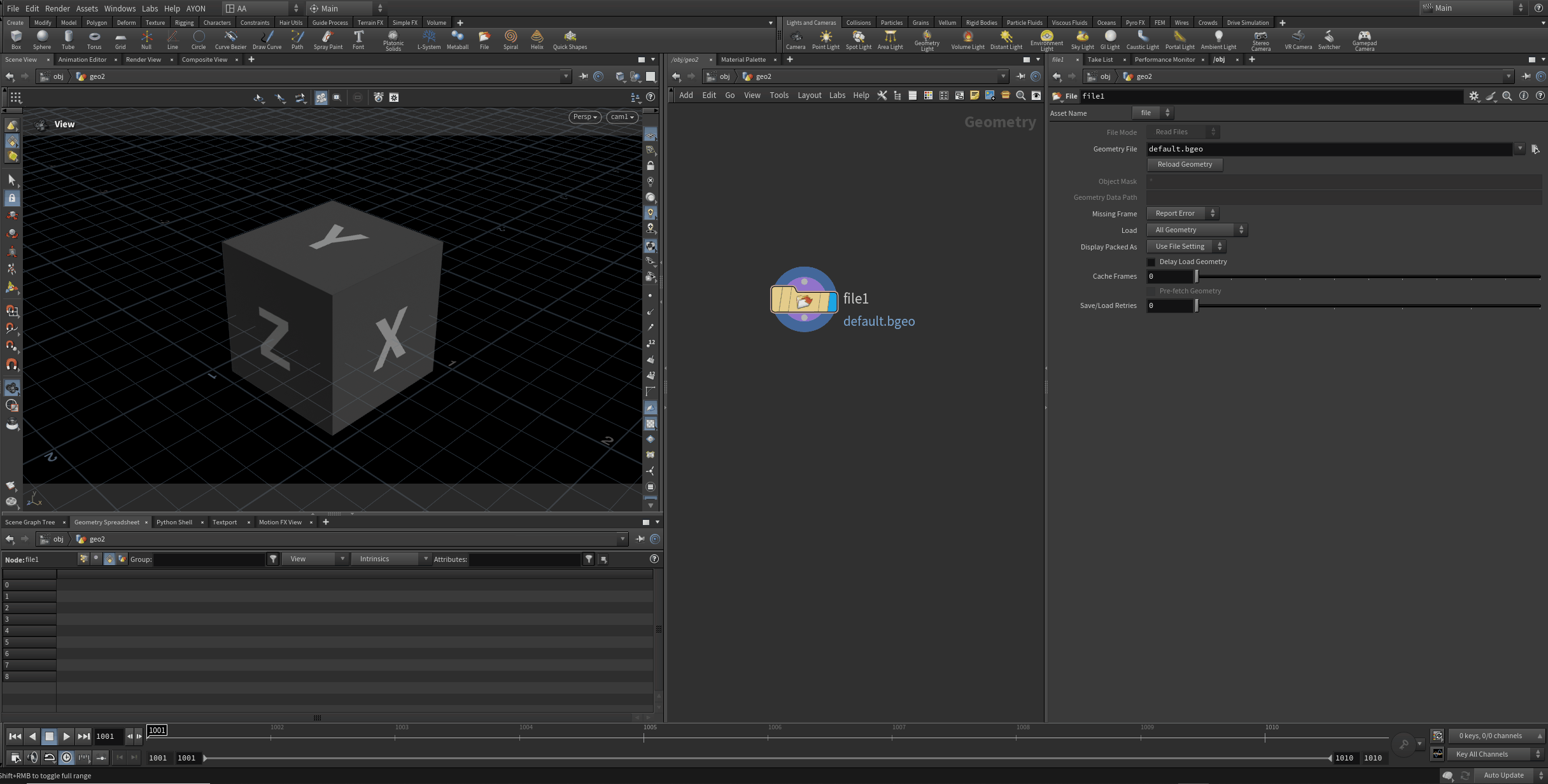
Loader HDAs
Generic Loader
Overview
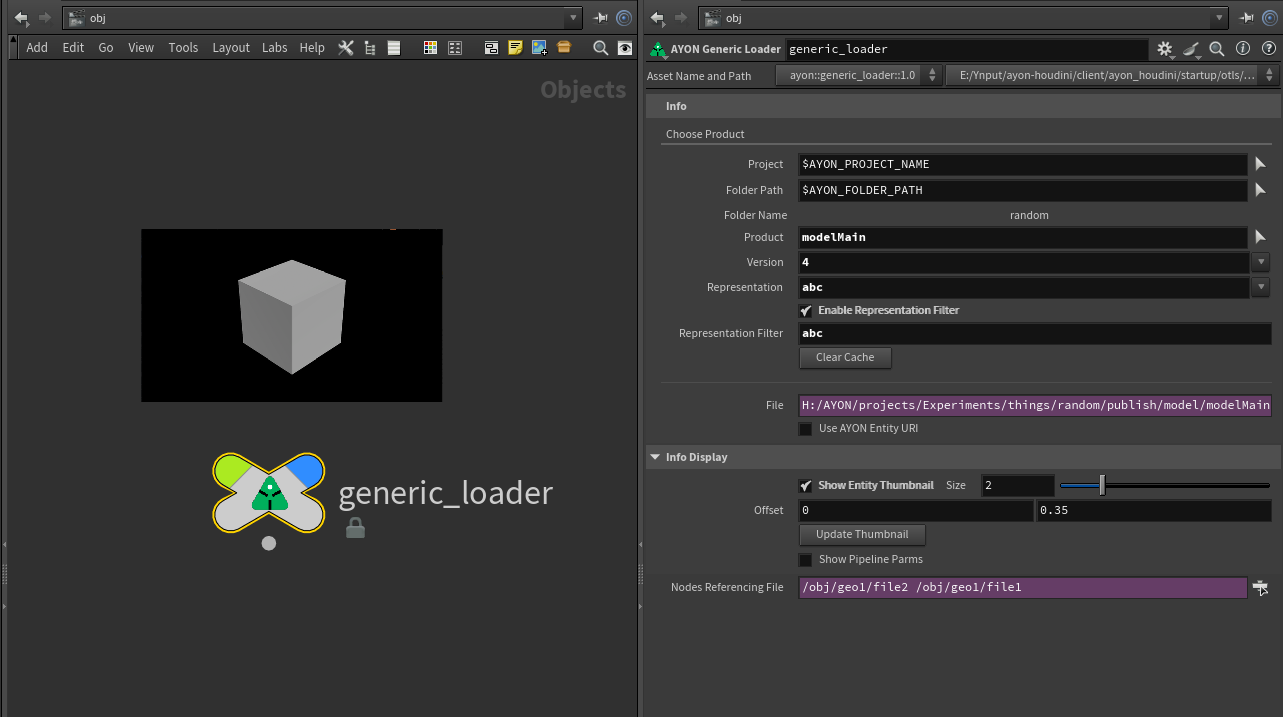
Parameters
- Project: Select a project.
- Folder Path: Select a folder path.
- Folder Name: Shows the name of the selected folder.
- Product: Select a product.
- Version: Select the product's version.
- Representation: Select the product's representation (format).
- Enable Representation Filter: Toggle to show the Representation Filter parameter.
- Representation Filter: Enter a space-separated list of representation names to filter. This filters the representation drop-down menu.
- Clear Cache: Clears the node's cache.
- File: Displays the file of the selected product. Automatically applies
$Fand<UDIM>tokens. - Use AYON Entity URI: When enabled, the File parameter becomes an AYON URI.
- Show Entity Thumbnail: When enabled, shows the selected product's thumbnail and extra parameters for adjusting the image in the network view.
- Size & Offset: Adjust the displayed thumbnail in the network view.
- Update Thumbnail: Click to manually update the thumbnail. Use this if auto-update doesn't work.
- Show Pipeline Parms: Displays extra pipeline parameters like
Representation ID, mainly for debugging and automation. - Nodes Referencing File: Displays nodes that reference the
Fileparameter.
How to Use Generic Loader
- Select the project and folder path.
- Choose the product, version, and representation.
- The File parameter will be populated, allowing you to copy and use it as needed.
- Product selection fields support expressions and context options. Find examples below Example Usages.
Lop Import
Overview
It uses a combination of the Generic Loader and the Reference node.
The representation filter parameter on the inner
Generic Loadernode is set to:usd usda usdlc usdnc abc
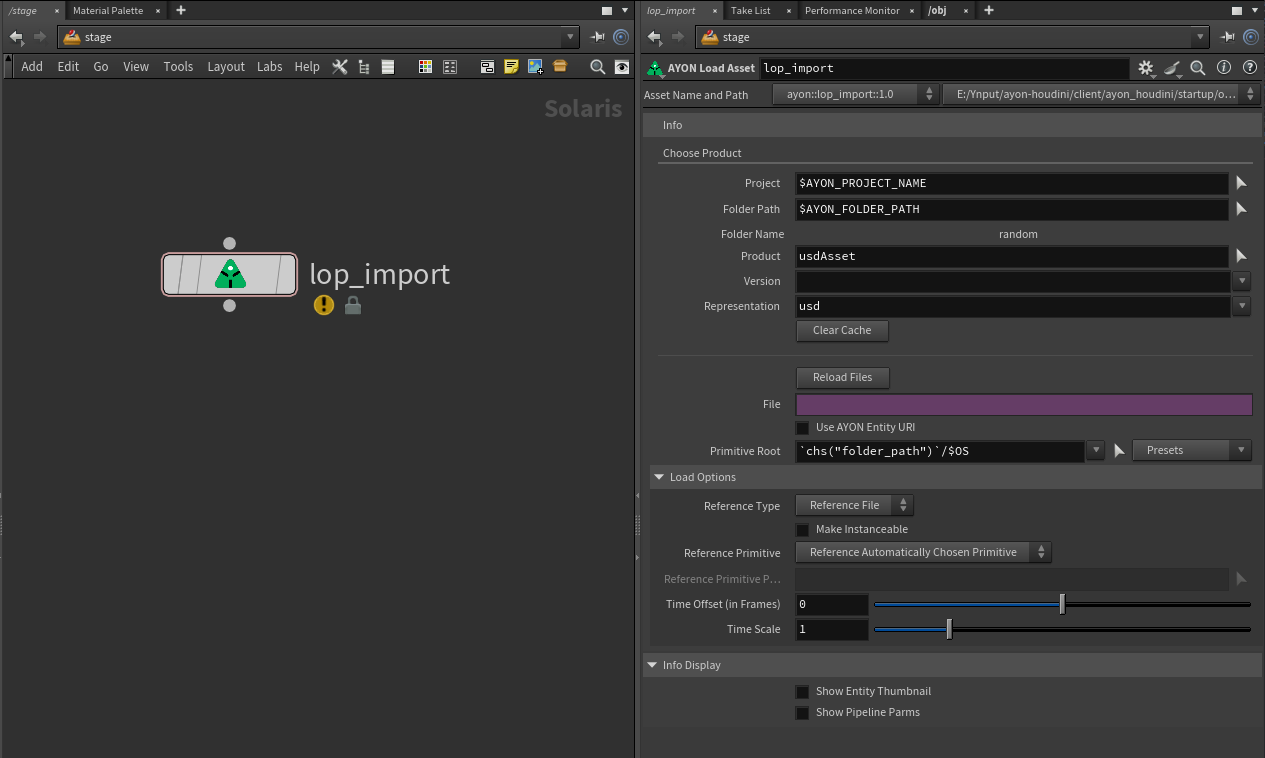
Parameters
This shares the same parameters as the Generic Loader and adds a few more. It also exposes some parameters of the Reference node.
Additional parameters on the node include:
- Reload Files: Click to reload the contents of all files imported by this node.
- Primitive Root: The referenced prim will be overlayed onto this prim, and the referenced prim’s descendants will become this prim’s descendants. If this prim doesn’t exist, the node will create it.
- Presets: This menu provides default values for building assets and shots.
- Reference Type: The type of composition arc to create to the referenced prim.
- Make Instanceable: Mark the new or modified prims as instanceable.
- Reference Primitive: Controls which prim to import from the multi-input connections.
- Reference Primitive Path: The scene graph path of the prim in the referenced layer that that is composed onto the stage. Contents of the referenced layer outside of this referenced primitive path will not appear on the composed stage. This parameter is only used if the Reference primitive parameter is set to “Reference specific primitive”.
- Time Offset (in Frames): Offsets all time samples from the file or target primitive on the first input. You can use this to re-time animations in the references file.
- Time Scale: Scales all time samples from the file or target primitive on the first input. You can use this to re-time animations in the references file.
How to Use LOP Import
- Selecting products works the same as with the Generic Loader.
- Set the
Primitive Root. ThePresetsmenu provides default values for building assets and shots.
Load Shot
Overview
It uses a combination of the Generic Loader and the Sublayer node.
The representation filter parameter on the inner
Generic Loadernode is set to:usd usda usdlc usdnc abc
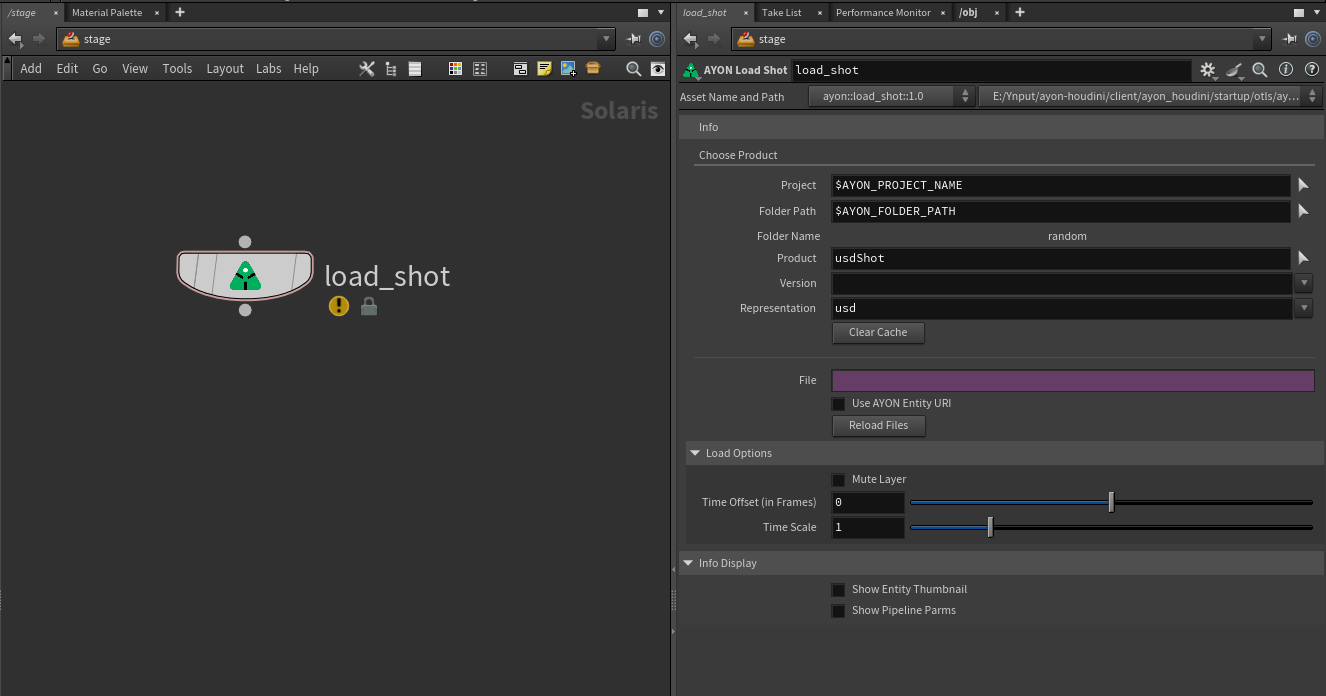
Parameters
It shares the same parameters as the Generic Loader and also exposes some parameters of the Sublayer node:
- Reload Files: Click to reload the contents of all files imported by this node.
- Mute Layer: Load the layer but immediately mute it. This may be useful if the layer must be loaded for other layers to work, but you don’t need to edit or display it.
- Time Offset (in Frames): Offsets all time samples from the file or target primitive on the first input. You can use this to re-time animations in the references file.
- Time Scale: Scales all time samples from the file or target primitive on the first input. You can use this to re-time animations in the references file.
How to Use Load Shot
- Selecting products works the same as with the Generic Loader.
- Keep in mind, it adds the loaded product as a sublayer.
Example Usages
These examples come from tests during the development of the HDAs and various discussions in our community. You might find some inspiration here. While they may not perfectly meet your studio's needs, they can serve as a good starting point.
Feel free to share your examples with us on the Ynput Community Forums.
Context Options and MultiShots
You can use a context options entry to select from, allowing the user to choose any folder in the project.
For example, you can create a context options menu that includes all folder paths in the current project.
Create Folder Path context menu
You can create a Python menu context option by using this:
from ayon_core.pipeline import get_current_project_name
import ayon_api
project_name = get_current_project_name()
folders = ayon_api.get_folders(
project_name,
fields={"path"},
has_children=False,
has_tasks=True
)
paths = [(folder["path"], folder["path"]) for folder in folders]
paths.sort()
return paths
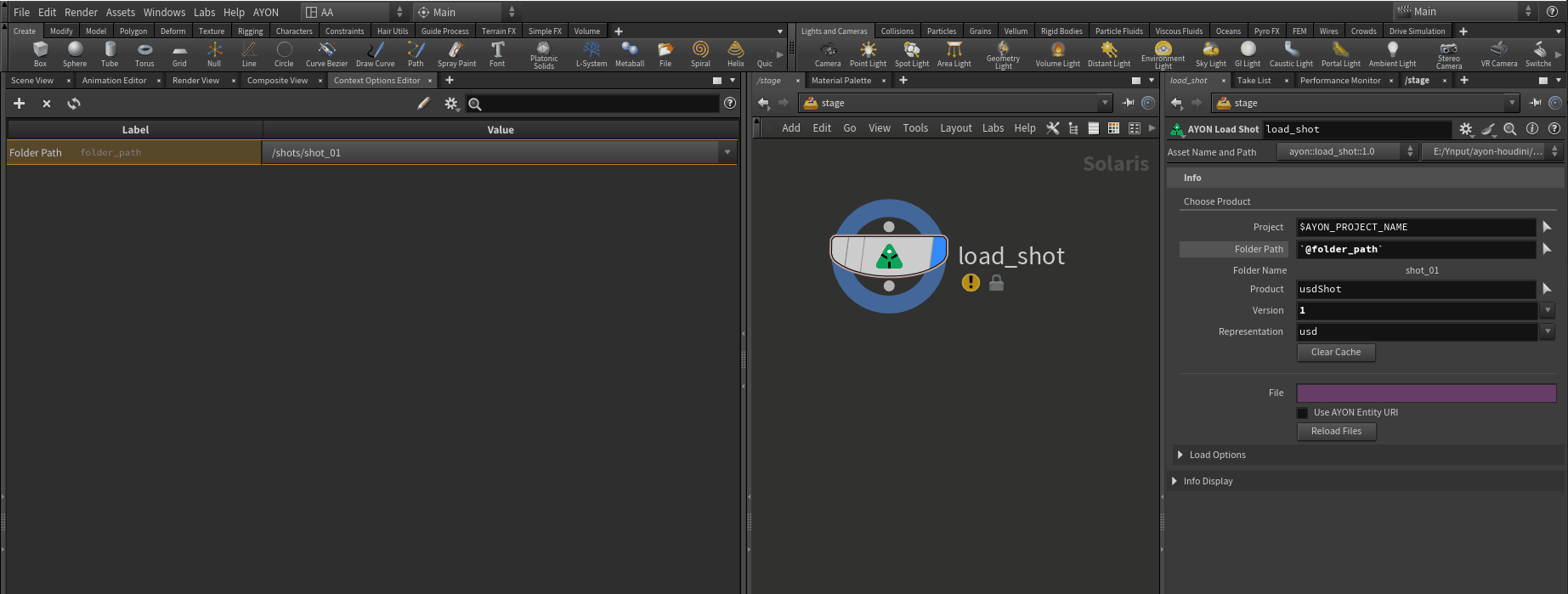
Expressions and Context Options
AYON Loader HDAs support expressions and context options, allowing users to automate operations.
For instance, you can use this feature to load multiple products in a loop with a single loader. This method requires the products to share the same name, differing only by a number.
First, I published three products: pointcacherock_1, pointcacherock_2, and pointcacherock_3.

Next, I loaded them into my scene using loader HDAs in a loop with expressions.
- LOP, expressions, and context options:
pointcacherock_`@ITERATIONVALUE+1`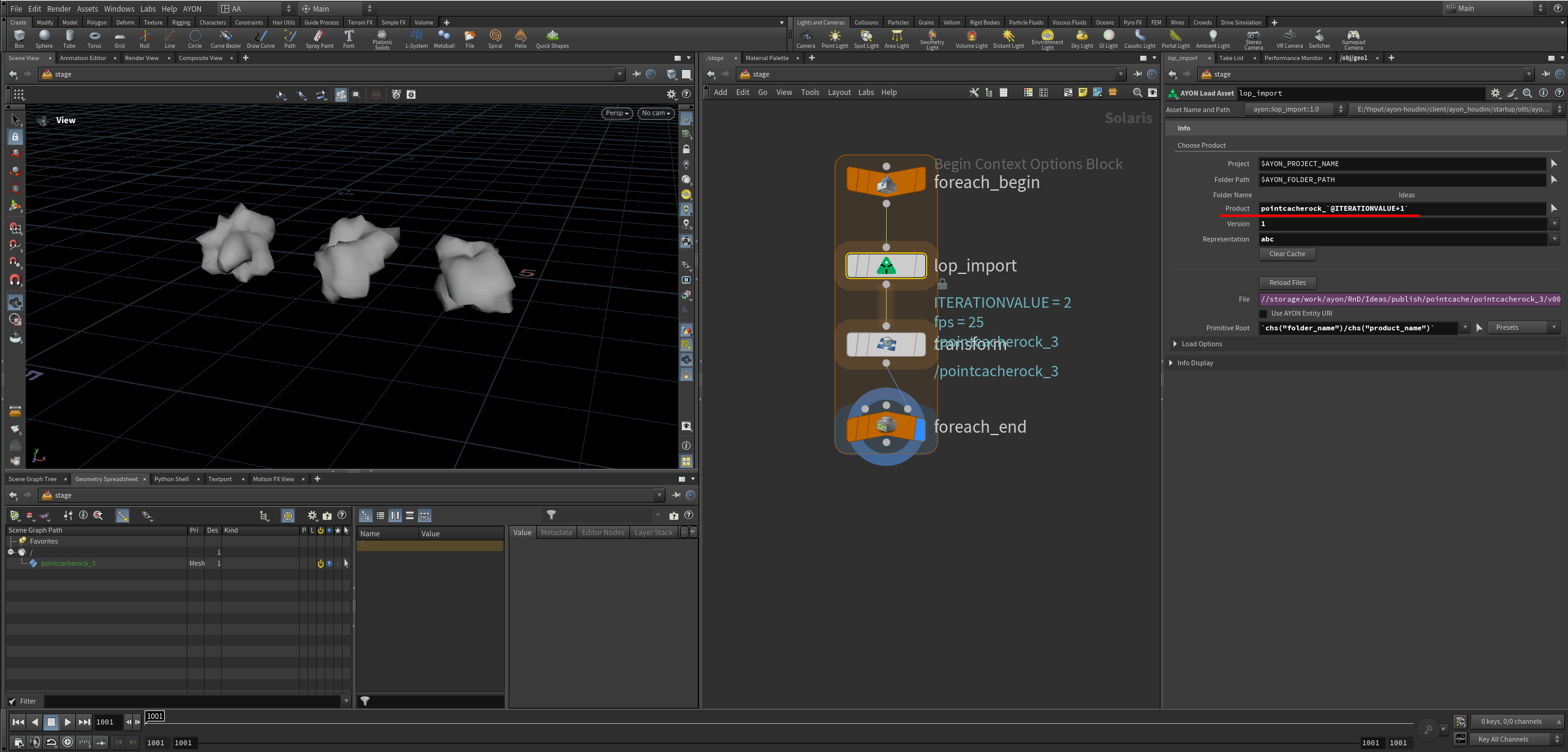
- SOP, expressions, and detail attribute:
pointcacherock_`detail("../foreach_count","iteration", 0)+1`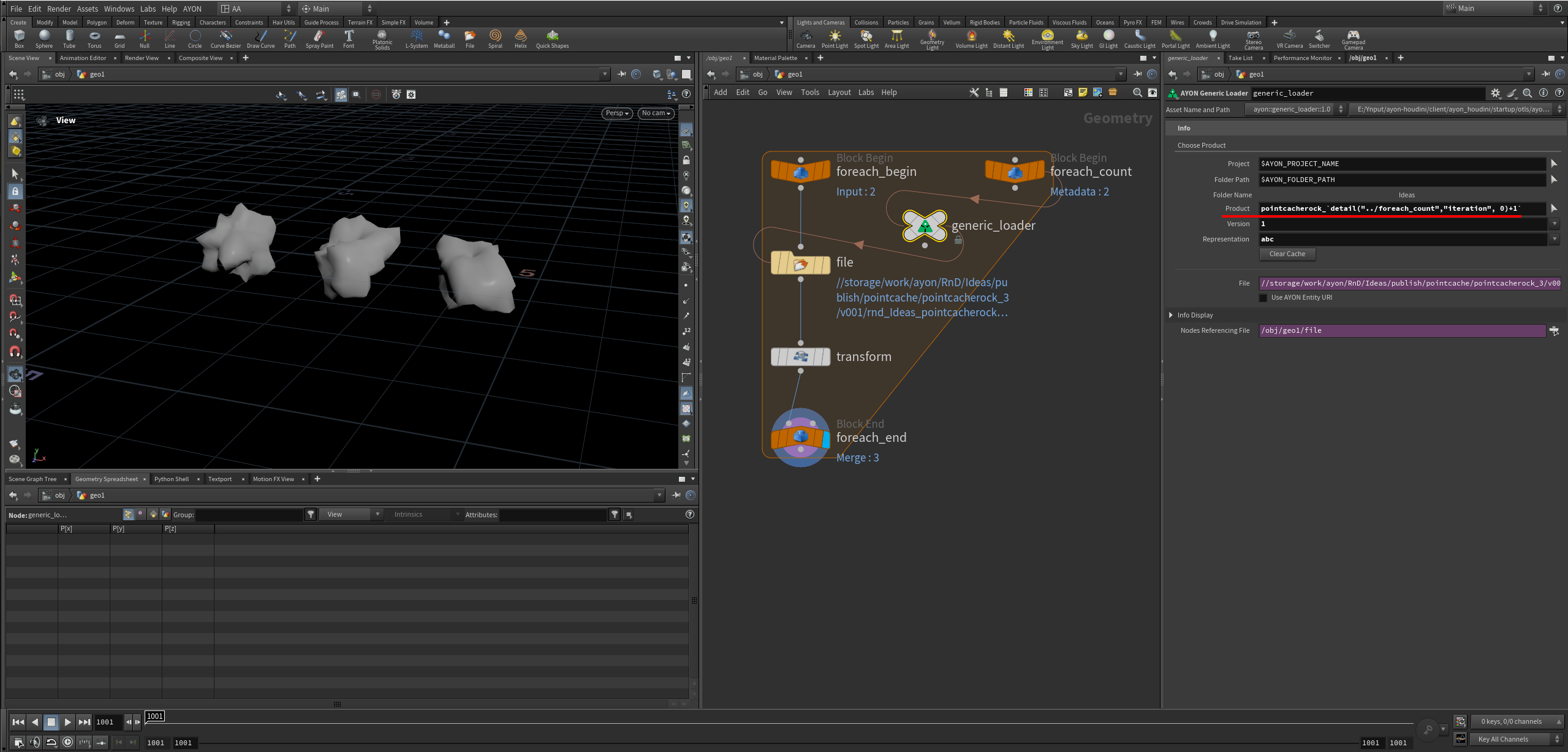
Build Your Own HDAs Using Generic Loader
One of the main uses of loader HDAs is to enable users to incorporate them into their own HDAs or build new HDAs on top of them.
My custom HDA example is based on using unified naming conventions for materials in my project.
In my HDA, I just need to select the material folder path within my library project and specify the version. I can also set the material prim path prefix.
Download my example custom HDA: Expr_random_hda_Material_Loader_v001.hda.
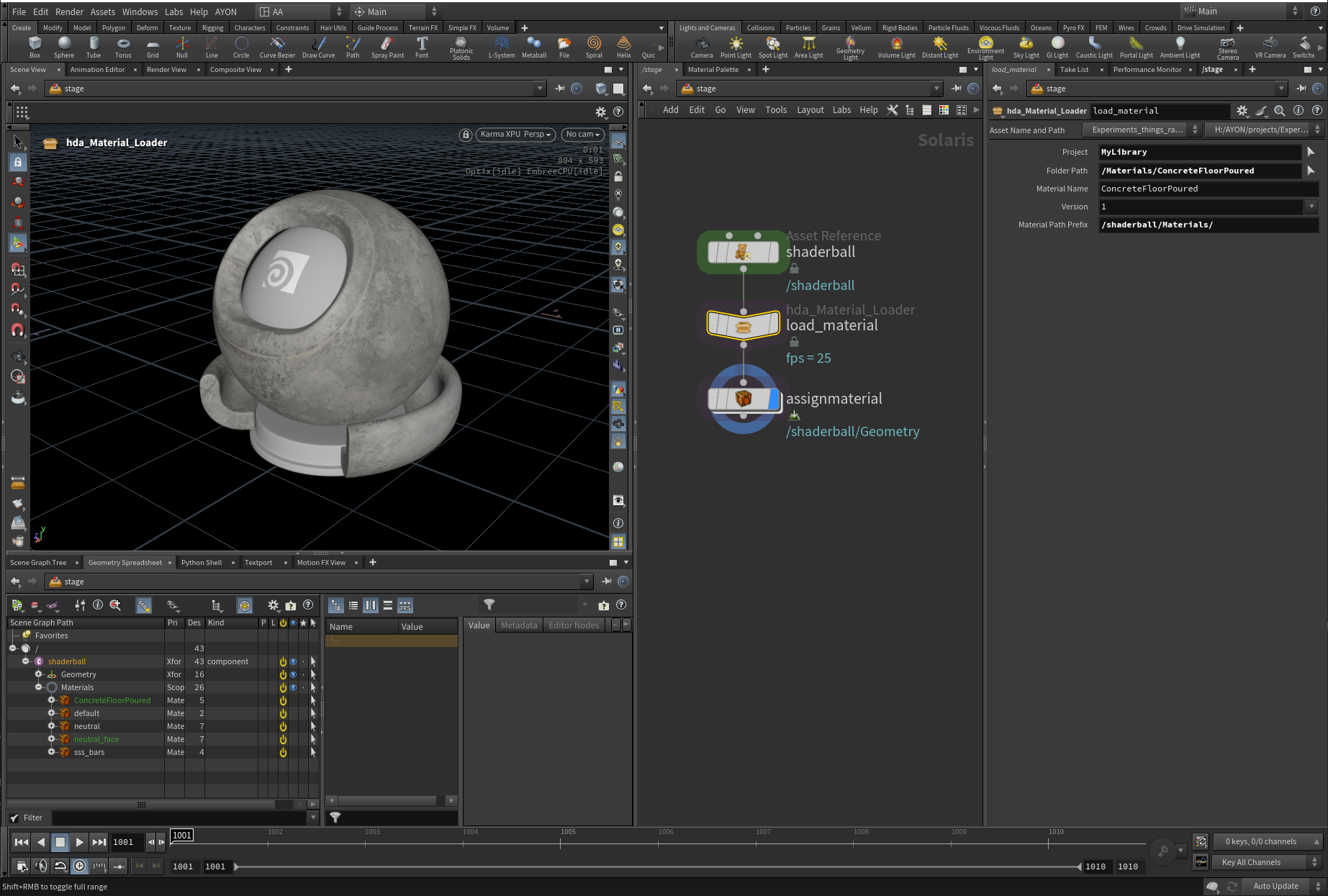
For this example, textures are published with the product type image and variant name materialName_AOV using Tray Publisher.

The material used in this example is Concrete Floor Poured | Poliigon.

